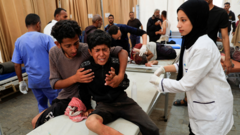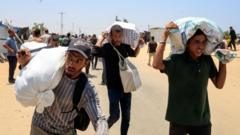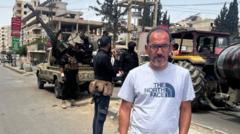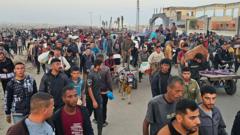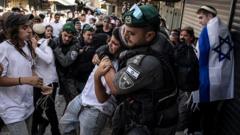Israeli security forces forcibly closed three schools in the Shuafat refugee camp, resulting in the unexpected dispersal of hundreds of Palestinian students just after classes commenced. The UN agency for Palestinian refugees (UNRWA) condemned the actions as a violation of international law and a deprivation of children's educational rights.
Closure of UN Schools in East Jerusalem Sparks Outrage and Fear for Palestinian Students

Closure of UN Schools in East Jerusalem Sparks Outrage and Fear for Palestinian Students
Israeli forces have shut down UN-run schools in East Jerusalem, leaving Palestinian children without access to education.
Israeli forces stormed three UN-run schools in the Shuafat refugee camp in East Jerusalem on Thursday morning, sending hundreds of Palestinian students home. The abrupt closure of these educational institutions drew immediate criticism from UNRWA's Commissioner-General, Philippe Lazzarini, who emphasized that Israeli authorities were undermining children's right to education while exhibiting a "blatant disregard of international law."
This recent shutdown aligns with an Israeli ban on UNRWA enacted earlier this year, with officials alleging that the agency has ties to Hamas—a claim that UNRWA firmly disputes. A closure notice affixed to one of the school walls explicitly prohibited any educational activities, leaving over 550 students aged six to 15 in an uncertain position regarding their education. The incident has raised concerns over the psychological impact on the children, especially following reports of one staff member's detention amid the chaos.
In addition to the Shuafat closures, Israeli police were deployed to three more schools in the surrounding area, similarly compelling them to dismiss students. Lazzarini took to X, stating that forcing school closures contravenes international law, declaring these educational institutions "inviolable premises of the United Nations." He urged parties to allow UNRWA schools to function to protect a generation of Palestinian youth.
Responses to the closures included condemnation from the Palestinian Authority, which decried the actions as a violation of children's rights to education. Furthermore, a coalition comprising the British consulate in Jerusalem and representatives from the UK, EU, Norway, Switzerland, Turkey, and Japan called this development appalling, expressing solidarity with affected students, parents, and educators.
Since its establishment in 1950, UNRWA has provided educational services in East Jerusalem, which Israel annexed in 1980—a move largely unrecognized internationally. The ongoing tensions surrounding the area reflect the complexity of the Israeli-Palestinian conflict, marked by competing claims to Jerusalem as the capital of their respective aspirations. With around 230,000 Israeli settlers residing alongside 390,000 Palestinians in East Jerusalem, the fallout from this recent closure could have long-lasting effects on the local education system and community stability, as many view the closure orders as legally and morally unjustifiable.
This recent shutdown aligns with an Israeli ban on UNRWA enacted earlier this year, with officials alleging that the agency has ties to Hamas—a claim that UNRWA firmly disputes. A closure notice affixed to one of the school walls explicitly prohibited any educational activities, leaving over 550 students aged six to 15 in an uncertain position regarding their education. The incident has raised concerns over the psychological impact on the children, especially following reports of one staff member's detention amid the chaos.
In addition to the Shuafat closures, Israeli police were deployed to three more schools in the surrounding area, similarly compelling them to dismiss students. Lazzarini took to X, stating that forcing school closures contravenes international law, declaring these educational institutions "inviolable premises of the United Nations." He urged parties to allow UNRWA schools to function to protect a generation of Palestinian youth.
Responses to the closures included condemnation from the Palestinian Authority, which decried the actions as a violation of children's rights to education. Furthermore, a coalition comprising the British consulate in Jerusalem and representatives from the UK, EU, Norway, Switzerland, Turkey, and Japan called this development appalling, expressing solidarity with affected students, parents, and educators.
Since its establishment in 1950, UNRWA has provided educational services in East Jerusalem, which Israel annexed in 1980—a move largely unrecognized internationally. The ongoing tensions surrounding the area reflect the complexity of the Israeli-Palestinian conflict, marked by competing claims to Jerusalem as the capital of their respective aspirations. With around 230,000 Israeli settlers residing alongside 390,000 Palestinians in East Jerusalem, the fallout from this recent closure could have long-lasting effects on the local education system and community stability, as many view the closure orders as legally and morally unjustifiable.

